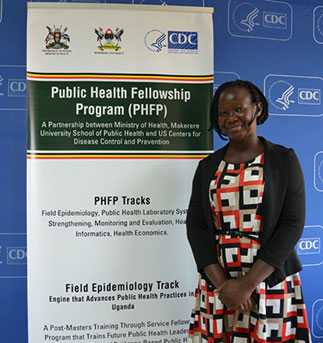FETP Face Time with the CDC Director: Lilian Bulage

Lilian Bulage, a Uganda FETP fellow
When 30-year-old Lilian Bulage enrolled in the CDC-supported Uganda Public Health Fellowship Program’s Field Epidemiology Track (also known as the Uganda FETP) early this year, she had no way of knowing that her training would include one-on-one mentoring from one of the world’s foremost public health professionals, CDC Director Tom Frieden, MD, MPH.
The experience was both humbling and inspiring for Bulage, who holds a master’s degree in health services research from Uganda’s Makerere University School of Public Health and has previous experience with the country’s National TB Reference Laboratory. “It was a golden opportunity to be mentored by such an important scientist! I was humbled by his expertise,” she says. “At first I was nervous, but, when he began talking about TB, I felt relaxed because I am quite familiar with the subject.”
Bulage was selected as a result of her complex and important work in investigating an outbreak of measles in a refugee settlement in western Uganda in July. Frieden had requested the chance to provide direct, one-on-one mentorship to fellows of CDC-supported FETPs around the world who were engaged on challenging projects, and she was identified as the first FETP fellow to receive this mentorship. The CDC director has asked that every CDC staff member working in a country with an FETP who has gone through the CDC Epidemic Intelligence Service to mentor trainees; and he is mentoring FETP trainees at least once a month. “Through the course of our conversation, I found out that Dr. Frieden and I shared similar experiences in the epidemiology field: We both did our first investigations on measles, we both worked in TB, and both of us started our epidemiology careers as ‘disease detectives,’” Bulage says. (Uganda’s FETP mirrors CDC’s Epidemic Intelligence Service, or EIS.) Bulage describes Frieden as approachable and a good listener, explaining that he allowed her the chance to talk about her work in detail and expressed genuine interest.
During their discussion, Frieden described his first EIS project, which was also a measles outbreak investigation, and mentored Bulage on ways to deal with different groups within communities such as the refugee settlement where she was conducting her investigation. He advised her to work within the settlement’s established communication channels—however informal—to promote information sharing among various groups. “Communication is the key, and communication is never as good as we think it is,” said Frieden. He urged Bulage and her colleagues to look at existing healthcare systems and health policies already in place and to assess current vaccination practices, including ensuring measles vaccination of all entering refugees, and working to initiate a second dose of measles vaccine for the general population. Perhaps most importantly, he urged her to remember that every outbreak scenario is different and therefore requires different investigative approaches and different public health interventions.
Hands-On Training for the Next Generation
CDC, in partnership with the Ministry of Health and Makerere University’s School of Public Health, launched the Uganda Public Health Fellowship Program’s Field Epidemiology Track in early 2015 as a two-year, learning-through-doing, post-graduate training. This new FETP is an outgrowth of a long-standing HIV/AIDS fellowship program supported by CDC through the US President’s Emergency Plan for AIDS Relief, which is designed to address critical technical and human resource gaps in Uganda’s public health sector. Within days of beginning their coursework, this first cadre of aspiring disease detectives were asked to join an investigation into a typhoid outbreak in the capital city and, soon after, to support the Ministry’s response to cholera and measles outbreaks in the west of the country.
For her part, Bulage is grateful to CDC, Makerere University, and the Ministry of Health for choosing her to be among the pioneers of such an elite training program in epidemiology and public health. But she is especially grateful for the unique mentorship she received from Frieden. “His advice was so rewarding! My call with him helped us refine our findings which are now being used to impact policy within the Ministry of Health,” she says. “I can’t thank him enough.”
This Inside Story by Betty Kagoro and Erik Friedly, CDC-Uganda
- Page last reviewed: March 10, 2016
- Page last updated: March 10, 2016
- Content source:


 ShareCompartir
ShareCompartir